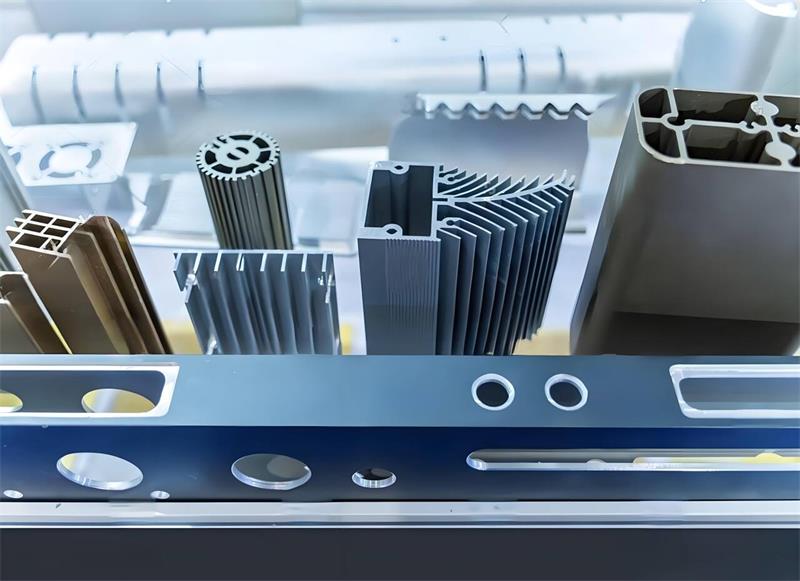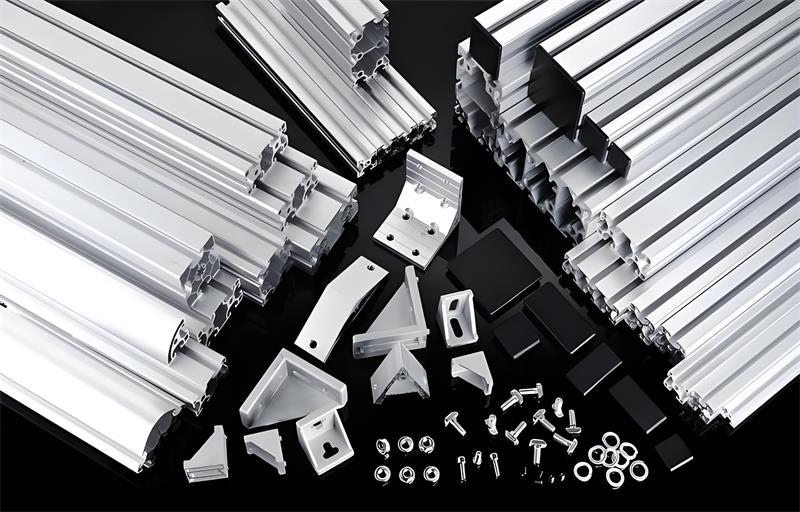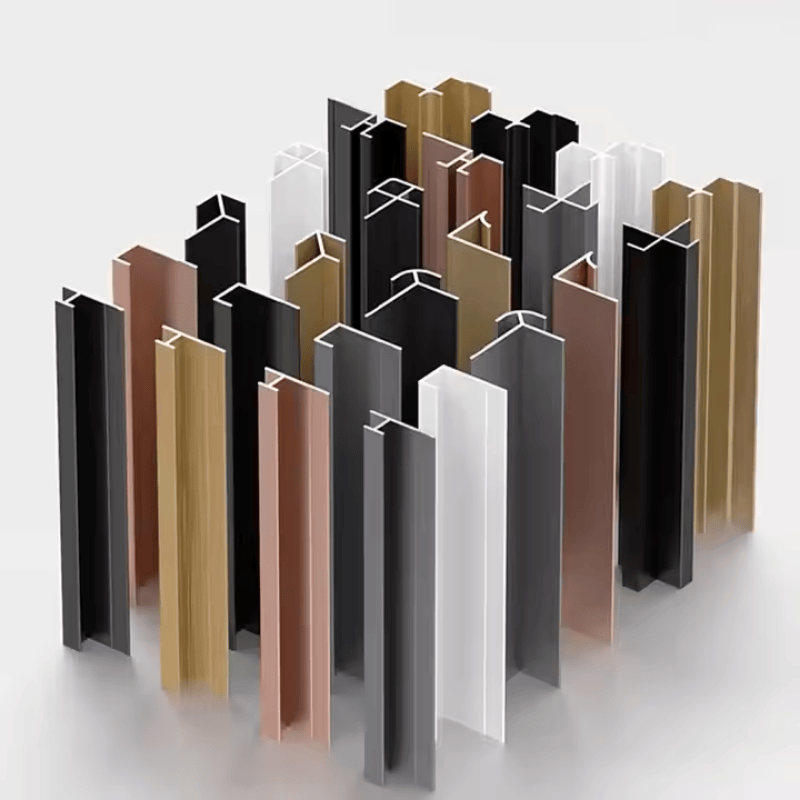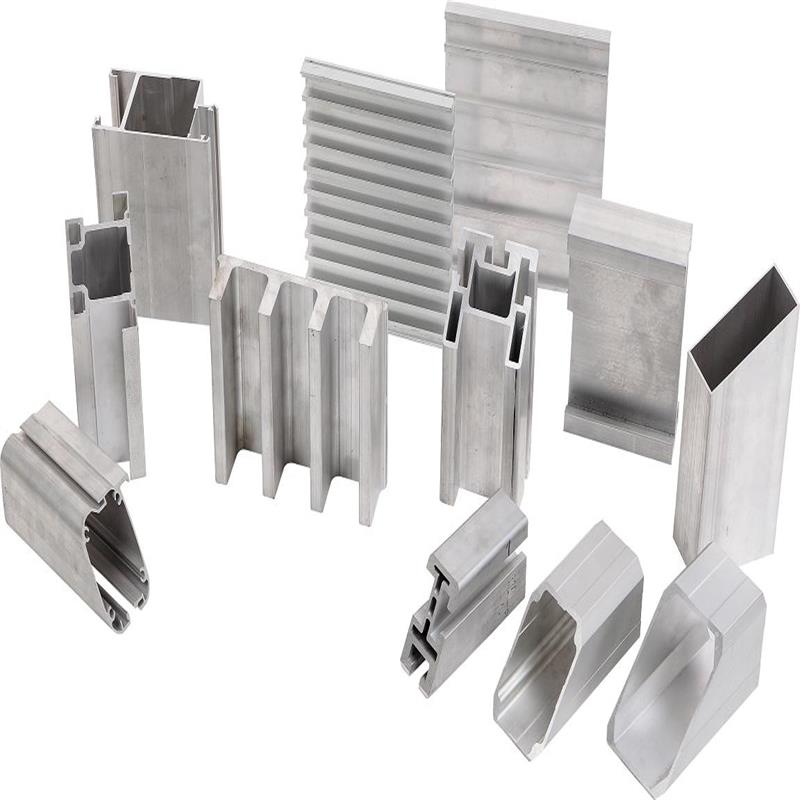How Many Types of Aluminum Profiles Are There?

How Many Types of Aluminum Profiles Are There?
Outline:
Introduction
1. The importance of aluminum profiles in modern industries
2. A brief overview of aluminum extrusion profiles and their versatility
What Are Aluminum Extrusion Profiles?
1. Defining extruded aluminum profiles
2. The extrusion process: creating durable and customizable profiles
The Different Types of Aluminum Profiles
1. Standard profiles: square, round, rectangular, and more
2. Custom profiles: tailored solutions for specific applications
3. Modular profiles: T-slot, L-shaped, and U-shaped profiles
Aluminum Profiles by Industry Use
1. Construction: aluminum doors, aluminum windows, curtain walls, structural supports
2. Automotive: frames, trims, lightweight structures
3. Aerospace: high-strength, lightweight aluminum components for aircraft
4. Industrial applications: machinery frames, support systems, conveyor structures
5. Marine industry: corrosion-resistant profiles for boats and docks
Understanding Surface Finishes for Aluminum Profiles
1. Anodizing: enhancing corrosion resistance and aesthetics
2. Powder coating: durable, customizable finishes
3. Mill finish: the natural, untreated look of aluminum
Standard vs. Custom Aluminum Profiles
1. When to choose standard profiles: cost-effective and readily available
2. When to opt for custom profiles: meeting exact specifications
3. Benefits of custom profiles: flexibility, precise dimensions, and unique finishes
Choosing the Right Aluminum Profile for Your Project
1. Key factors to consider: strength, size, corrosion resistance, finish
2. Industry-specific needs: understanding load requirements and environmental exposure
3. Working with a trusted aluminum profile supplier for the best results
Why Aluinno Aluminum Company is the Right Choice for Aluminum Profiles
1. Overview of Aluinno’s product range: standard and custom solutions
2. Why quality matters: choosing the best extruded aluminum profiles supplier
3. Customization and consultation services offered by Aluinno Aluminum Company
Conclusion
1. Recap of the types of aluminum profiles and their versatility
2. Contact Aluinno Aluminum Company for high-quality aluminum extrusion profiles
Introduction
Aluminum profiles play a crucial role in modern construction, manufacturing, transportation, and other industries. These versatile structural components are widely known for their lightweight, strength, and resistance to corrosion, making them ideal for numerous applications. But how many types of aluminum profiles are there, and what makes each one suited to specific projects?
In this article, we’ll explore the many types of aluminum extrusion profiles, from standard to custom solutions. Whether you're in the construction, automotive, aerospace, or industrial machinery sector, understanding the different types of aluminum profiles and how they can benefit your project is key to making informed decisions. We’ll also highlight how working with a trusted extruded aluminum profiles supplier like Aluinno Aluminum Company can ensure the success of your project.
What Are Aluminum Extrusion Profiles?
Before we dive into the specific types of aluminum profiles, it's essential to understand what aluminum extrusion profiles are and how they are made.
Aluminum extrusion profiles are structural shapes formed by pushing heated aluminum through a die, which gives the material a specific cross-sectional shape. This extrusion process creates long, durable profiles that can be cut to the required lengths and customized for various applications. Extrusion allows for high precision, making it possible to produce complex shapes while maintaining the material’s structural integrity.
These profiles are often used in industries that require materials that are lightweight, durable, and resistant to environmental conditions, such as construction, transportation, and industrial machinery.
The Different Types of Aluminum Profiles
There are several types of aluminum profiles, each designed for specific applications and industries. Here’s a closer look at the major categories of extruded aluminum profiles:
1. Standard Profiles
Standard aluminum profiles are the most commonly used shapes and are widely available. They include basic shapes such as:
l Square profiles: These are often used in construction for building frames, furniture, and support structures. Square profiles offer a good balance of strength and simplicity.
l Round profiles: Round or tubular profiles are commonly used in applications like piping, tubing, railings, and structural columns. These profiles are lightweight but offer excellent strength and rigidity.
l Rectangular profiles: Like square profiles, rectangular aluminum profiles are often used in building structures and frameworks. Their flat sides make them easy to work with for certain types of construction and assembly.
l L-shaped and U-shaped profiles: These profiles are used for corner supports, brackets, edge protection, and architectural details.
2. Custom Profiles
Custom aluminum profiles are designed and manufactured to meet specific project requirements. These profiles can be tailored to unique shapes, dimensions, and applications. While standard profiles are cost-effective and readily available, custom profiles offer more flexibility and precision, which can be essential in industries like aerospace, automotive, and industrial manufacturing.
Custom aluminum profiles are often used for specialized components, such as parts for heavy machinery, high-performance vehicles, and complex architectural structures. By working with a reliable aluminum profile manufacturer, companies can get profiles that meet their exact needs in terms of strength, appearance, and performance.
3. Modular Profiles
Modular profiles, such as T-slot profiles, are known for their versatility. These profiles are widely used in industrial applications because they can be easily assembled and disassembled without welding or special tools. T-slot profiles are commonly used to build frameworks, conveyor systems, workstations, and machinery enclosures.
The modular design allows for the attachment of other components, such as brackets, shelves, and sensors, making them highly customizable for a variety of industrial purposes.
Aluminum Profiles by Industry Use
Aluminum profiles are used across a wide range of industries, each of which requires specific types of profiles for different applications. Here’s how aluminum extrusion profiles are used in several key industries:
1. Construction Industry
In construction, aluminum profiles are widely used for structural and architectural applications due to their corrosion resistance, light weight, and ease of fabrication. Common uses include:
l Window and door frames: Aluminum’s resistance to weathering and corrosion makes it ideal for windows and doors, particularly in areas exposed to the elements.
l Curtain walls: Aluminum profiles are often used in the construction of curtain walls for modern buildings. These walls are non-structural but serve as an outer covering for buildings, providing an aesthetically pleasing appearance while protecting the interior from environmental exposure.
l Roofing and structural supports: Aluminum’s strength-to-weight ratio makes it suitable for structural components such as beams, columns, and roofing systems in both residential and commercial construction.
2. Automotive Industry
The automotive industry has increasingly turned to aluminum profiles to improve fuel efficiency and reduce vehicle weight without compromising safety. Common uses in this industry include:
l Body frames: Aluminum is commonly used to create lightweight, high-strength frames for cars, trucks, and SUVs.
l Trims and exterior components: Aluminum profiles are used for automotive trims, bumpers, and other exterior components, offering durability and corrosion resistance in harsh weather conditions.
l Lightweight engine components: Many automakers use aluminum profiles to reduce the weight of engine components, improving performance and fuel efficiency.
3. Aerospace Industry
In the aerospace industry, weight reduction is critical for fuel efficiency and overall performance. Aluminum profiles are used extensively in aircraft for both structural and non-structural components.
l Aircraft frames: Extruded aluminum profiles are used to create lightweight yet strong frames for aircraft bodies.
l Interior structures: Profiles are used in seating frames, overhead storage bins, and other interior structures where weight must be minimized.
l Wing components: Aluminum’s high strength-to-weight ratio makes it an ideal material for wing spars and ribs, which must support significant loads while minimizing the aircraft’s overall weight.
4. Industrial Applications
In industrial machinery and manufacturing, aluminum profiles are widely used for creating modular systems, conveyor frameworks, and machine enclosures. Their light weight, strength, and flexibility make them ideal for building custom machinery structures.
l Frames and support systems: Aluminum profiles are used to construct lightweight, durable frames for machines, workstations, and other support systems.
l Conveyor systems: T-slot aluminum profiles are commonly used to build conveyor belts, which require easy assembly and modification based on the production process.
5. Marine Industry
Aluminum is the preferred material for many marine applications due to its excellent corrosion resistance in saltwater environments. Common uses in this industry include:
l Boat hulls and decks: Aluminum profiles are used to create lightweight, durable boat hulls, decks, and railings.
l Docks and piers: Aluminum is often used to build piers, docks, and other marine infrastructure because it can withstand the harsh marine environment without rusting or corroding.
Understanding Surface Finishes for Aluminum Profiles
Surface finishes are an important factor when choosing aluminum profiles, as they can enhance both the appearance and performance of the material. Here are the most common types of surface finishes available for extruded aluminum profiles:
1. Anodizing
Anodizing is an electrochemical process that thickens the natural oxide layer on the surface of the aluminum, improving its corrosion resistance and durability. This finish is often used in architectural and outdoor applications, where the aluminum is exposed to the elements. Anodized aluminum can also be colored, allowing for a wide range of design possibilities.
2. Powder Coating
Powder coating involves applying a dry powder to the surface of the aluminum profile, which is then cured under heat to create a smooth, durable finish. This process provides excellent protection against corrosion, abrasion, and weathering, making it a popular choice for outdoor applications, automotive components, and industrial machinery.
3. Mill Finish
A mill finish is the natural, untreated surface of aluminum as it comes out of the extrusion process. While it lacks the protective qualities of anodizing or powder coating, a mill finish is suitable for indoor applications where the aluminum won’t be exposed to harsh conditions or aesthetic considerations aren’t a priority.
Standard vs. Custom Aluminum Profiles
When selecting aluminum extrusion profiles for your project, you may need to choose between standard and custom profiles. Both options have their advantages, depending on your project requirements.
1. Standard Profiles
Standard profiles are readily available and cost-effective. They come in common shapes such as square, rectangular, and round profiles, making them suitable for most general applications. If your project doesn’t require specific dimensions or features, standard profiles may be the best option for saving both time and money.
2. Custom Profiles
If your project requires unique dimensions, shapes, or performance characteristics, custom aluminum profiles are the way to go. Custom profiles are tailored to meet the exact needs of your project, offering flexibility in design and the ability to create complex shapes that standard profiles can’t achieve. Custom profiles are often used in industries like aerospace, automotive, and industrial machinery.
Choosing the Right Aluminum Profile for Your Project
Selecting the right aluminum profile for your project requires careful consideration of several factors:
1. Strength Requirements
Ensure that the profile you choose offers the necessary strength for your application. For example, structural profiles may be required for load-bearing applications, while lightweight profiles may be sufficient for non-structural uses.
2. Size and Shape
Measure the space where the profile will be used and choose dimensions that fit your project’s requirements. Standard profiles offer a wide range of sizes, but custom profiles can be designed for more precise fits.
3. Corrosion Resistance
Consider the environment in which the profile will be used. If it will be exposed to moisture, chemicals, or saltwater, opt for profiles with anodized or powder-coated finishes to improve their resistance to corrosion.
4. Working with a Trusted Aluminum Profile Supplier
It’s crucial to work with a reliable aluminum profile supplier that offers both quality materials and expert guidance. A trusted supplier will help you select the right profiles based on your project’s needs and provide custom solutions when necessary.
Why Aluinno Aluminum Company is the Right Choice
At Aluinno Aluminum Company, we pride ourselves on being a leading aluminum profile manufacturer and supplier, offering a wide range of both standard and custom profiles. Here’s why you should choose us for your next project:
1. Diverse Product Range
Whether you need standard square profiles or complex custom extrusions, Aluinno Aluminum Company has a vast selection of profiles to meet the demands of your industry. Our products are designed for use in construction, automotive, aerospace, and more.
2. Custom Solutions
For projects that require unique shapes or specifications, we offer custom profiles tailored to your exact requirements. Our experienced team of engineers will work with you to design profiles that fit your project’s needs perfectly.
3. Commitment to Quality
At Aluinno Aluminum, we use high-quality materials and adhere to strict quality control standards to ensure that every profile we produce meets your expectations in terms of strength, durability, and performance.
4. Expert Guidance
Choosing the right aluminum profile can be complex, especially for specialized projects. Our knowledgeable team is here to help you select the best profile for your application, ensuring your project runs smoothly from start to finish.
Conclusion
There are many types of aluminum extrusion profiles, ranging from standard shapes like square and round profiles to custom solutions designed for unique applications. Each type serves a specific purpose, whether it’s in construction, automotive, aerospace, or industrial machinery. Understanding the different types of aluminum profiles and their specific uses will help you make the best choices for your project.
When it comes to sourcing high-quality extruded aluminum profiles, Aluinno Aluminum Company is a trusted partner. Whether you need standard profiles for a quick project or custom extrusions for a specialized application, we have the expertise and products to meet your needs.
Looking for high-quality aluminum extrusion profiles for your next project? Contact Aluinno Aluminum Company today to speak with one of our experts. We offer a wide range of standard and custom profiles designed to meet the specific needs of your industry. Let us help you find the perfect solution for your project, whether it’s for construction, automotive, industrial, or aerospace applications.


 En
En



 Location:
Location:















